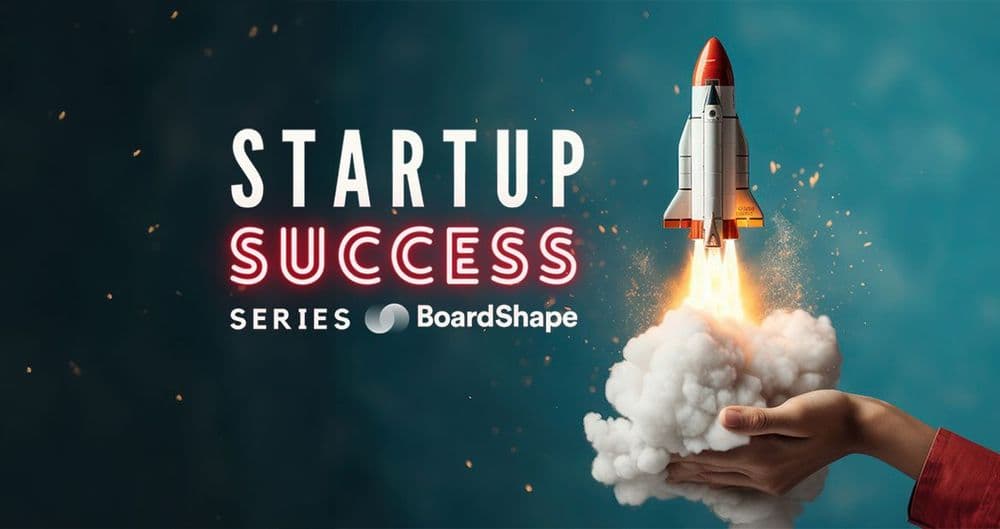The journey to startup success can often feel like a precarious balancing act and the daunting statistics about startup failures can be disconcerting for any founder. In this exclusive interview we bring you a beacon of hope and a wealth of wisdom from multi-award winning entrepreneur and esteemed mentor Kay Kukoyi.
We explore common founder challenges, strategies for overcoming them, financial tips and how to avoid common traps.
This article will instill the hope and knowledge you need to chart your path to success. A list of the main takeaways is included at the end.
Thank you Kay for sharing your time and invaluable insights!
Kay Kukoyi
Kay Kukoyi CSM FITOL (Linkedin) is a multi-award-winning entrepreneur, trainer and speaker. She is the author of 5 books, and was recognised on the (#IB100), the Financial Times and Inclusive Boards list of the 100 Most Influential BAME Leaders in the UK Tech sector. Kay is the founder and CEO of Purposeful Group, an entrepreneurship, technology and digital skills training company. The company has supported more than 10,000 entrepreneurs, SMEs and digital learners in 14 countries across 6 continents through its bestselling books, professional mentoring, and popular workshops and programmes. (https://www.purposefulgroup.com/)
Q: What common challenges do most startup founders face in the early stages, and what strategies can you suggest to overcome them effectively?
There are so many steps in the entrepreneurial journey from initial idea through to launching a business, hustling for those first customers and then focusing on growth! First and foremost, you’re getting a solid grasp of the problem that you're trying to solve, and marrying that up with the best, and most appropriate solution for the customer group(s) that you’ve decided to serve. The business won’t survive if there aren’t enough interested customers continuing to pay for the product or service, so carrying out market research is critical.
Q: What form should this market research take
Consider not only qualitative research in the form of questionnaires, but qualitative research in the form of discussions with people who experience “the problem” that you’re trying to solve. The information gathered will not only clarify whether your business idea is worth pursuing, but can generate so many valuable by-products, including testimonials, anecdotes and verbatim quotes that can be used on a website, included in pitches and even in marketing campaigns.
Q: A large percentage of startups fail because they run out of money. Can you give any advice to help founders to stay afloat?
Research is important here, as is the ability to project into the future to consider what your business needs and costs are going to be. The ability to do this thoroughly is something that can either attract or repel an investor; a poorly put together budget with lots of unknowns or gaps does not inspire confidence. You’ll need a well put together plan which demonstrates a clear and realistic understanding of the costs that a newly formed business will incur over an 18 month – 2 year period.

Q: What components should this financial plan consist of?
Consider weekly, fortnightly, monthly, and quarterly expenses, as well as annual costs. Don’t forget one-off, or occasional expenses such as costs for professional advice, or fees related to trademarks, patents or similar. With just a few unanticipated expenses or miscalculations, your cash runway - the amount of time that your funds are expected to last, could be slashed to a much shorter period. At this point you will have a financial shortfall and won't be able to keep the business running for as long as you’d planned. When doing your financial planning, don’t budget too optimistically and allow yourself some margin for error. As an example, inflation has hit both consumers and businesses hard this year, leaving some businesses struggling to survive with higher than expected running costs.
Q: After this thorough financial planning how can a founder then get the product out there as efficiently as possible?
Some business ideas are definitely more resource hungry than others to start and run, but challenge yourself to come up with a very basic product or service that can be created in the space of 3 - 6 months (ideally 3!) Remember, this is only the first iteration of your business offering. It’s going to continue to evolve and improve over time. Avoid trying to be perfect, and don’t over complicate your solution! Get something ready for use that is good enough to meet customers’ core needs, so you can get valuable feedback from real people a.s.a.p. - this is your MVP - your Minimum Viable Product.

Q: Founders often end up juggling a multitude of responsibilities. How can they balance it all?
There are so many plates being spun by one person, or a just a few people in the early days and this can be overwhelming. Timeboxing and brutal prioritisation of tasks will help you to manage your workload. Focus on activities that are truly important, and those that are going to give you the highest Return on Investment first. If you focus on low value work, your days will be long, yet progress will be slow!
Q: What approaches have you seen work best for startup founders in validating their product or service in the market to ensure they're addressing a real need?
Developing a close relationship with a group of early adopters interested in testing your product or service and providing you with feedback can be very powerful. This group should be representative of the types of customers you expect to serve, and they should not be afraid to share their opinions! A resource like this can help you make the right decisions about how your product or service should evolve, and the best ways to meet customers’ needs and expectations. It should never be the case that you do a little research at the beginning of the process when you have your initial idea, and then finally, there’s a big reveal of the final product or service when you launch.
Q: Can you share some practical approaches to make this testing phase successful?
As your product or service is being developed, schedule in check-points when you will reach out, “show and tell”, and allow people to give you feedback. Ideally, let them get hands-on with the product or service too! You cannot rely on gut instinct alone. Asking for feedback might make you feel a little nervous, but be brave, keep an open mind, and allow people to tell you exactly what they think, whether good or bad. If you know the honest truth about where you stand, you’ll minimise the risk of receiving nasty shocks in the future. There’s nothing worse than working hard, then facing the reality that you've taken several wrong turns and no-one caught these errors in time. Big mistakes are time-consuming and costly to fix, and may kill a business completely. This really does happen to startups. Don’t fall into this trap!

Q: What critical decisions are founders likely to face that have a lasting impact on a startup's trajectory?
There are so many choices – The right problem to solve, the solution chosen to address the problem, and picking the best customer group(s) so the problem, solution and customer fit together like a jigsaw puzzle… When that happens, you’ll start to gain momentum. I've seen scenarios where people are thinking about offering a solution to a particular customer group, mainly because they know a few people from that community. That's not to say that there isn’t a benefit to doing this, but often I can see that a product or service intended for one group could be great for a higher value group.
Q: Finding more value in your product would be a great discovery! Could you give an example?
E.g. A low cost B2B product could become a higher priced B2B solution targeted at a different customer group. So, think very carefully about who else your solution COULD be for and keep both eyes open for opportunities. I've seen founders who have started out in the general market (always start with a niche!) and have realized that they can sell that product into much larger companies as an enterprise solution. Suddenly, what they were offering for $35 a month is now $120 a month – and that’s now their lowest priced offering! Keep brainstorming, keep thinking. Don't take your first answer as the right one, because often you need to dig deep to have a eureka moment so you can really power ahead.
Q: All founders should have a mentor - How can founders make the most of their relationship with mentors to gain strategic insights, access to networks, and specialized knowledge?
Reflect on your needs and prepare a list of the questions or quandaries that are troubling you the most, then ask your mentor for their perspective on any challenges you’re facing. How would they approach the situation? Do your plans seem sensible to them? What have you overlooked, or missed? Some mentors are great for very specific types of support, contacts or industry insights. Some can provide great advice across a range of topics. So you’re clear on where to direct the conversation, ask your mentor where they think their strengths lie.

Q: What approach do you personally take to your mentoring work
My approach as a mentor is highly practical. We’ll discuss strategy, tactics, resources, and the software and tools needed to get tasks completed efficiently. We’ll talk through different techniques, and how the founder is going to execute their plan. I’ll also demonstrate, and show them how to push forward with the execution element of the tasks, and give examples. Then things become really clear, and the mentee feels more positive and confident with both what they need to do, and how they are going to do it!
Key Takeaways
-
Market Research
Start by understanding the problem you're solving and conducting market research to validate your business idea.
-
Financial Planning
Create a comprehensive financial plan, considering weekly, monthly, quarterly, and annual expenses. Do not budget too optimistically to avoid running out of money.
-
Balancing Workload
Manage your workload by prioritizing important tasks and focusing on high-return activities.
-
Minimum Viable Product (MVP)
Develop a basic product or service within 3-6 months and gather feedback from real users to avoid overcomplicating your solution.
-
Early Adopters
Build a relationship with a group of early adopters who represent your target audience to get valuable feedback.
-
Feedback Loops
Schedule checkpoints for feedback and encourage open, honest opinions from users to make informed decisions.
-
Discovering More Value
Explore opportunities to find additional value in your product or service, potentially serving higher-value customer groups.
-
Mentorship
Find a mentor and make the most of the relationship by seeking guidance on specific challenges and leveraging their expertise in areas where they excel.
Thanks Kay!
Thanks again to Kay Kukoyi (Linkedin) for these invaluable insights. Check out the inspiring entrepreneurship and mentoring work Kay does at purposefulgroup.com
Introducing Boardshape
Our board management solution is an an invaluable asset for optimizing your virtual meetings. Use our agenda builder to:
- Collaboratively draft meeting agendas.
- Assign agenda items to team members.
- Centralize all meeting materials.
- Incorporate live polls for decision-making.
- Easily monitor follow-up communication through comment sections for each item.
Our presentation mode means seamless synchronization during meetings, ensuring everyone has the right documents readily available at the appropriate time.

